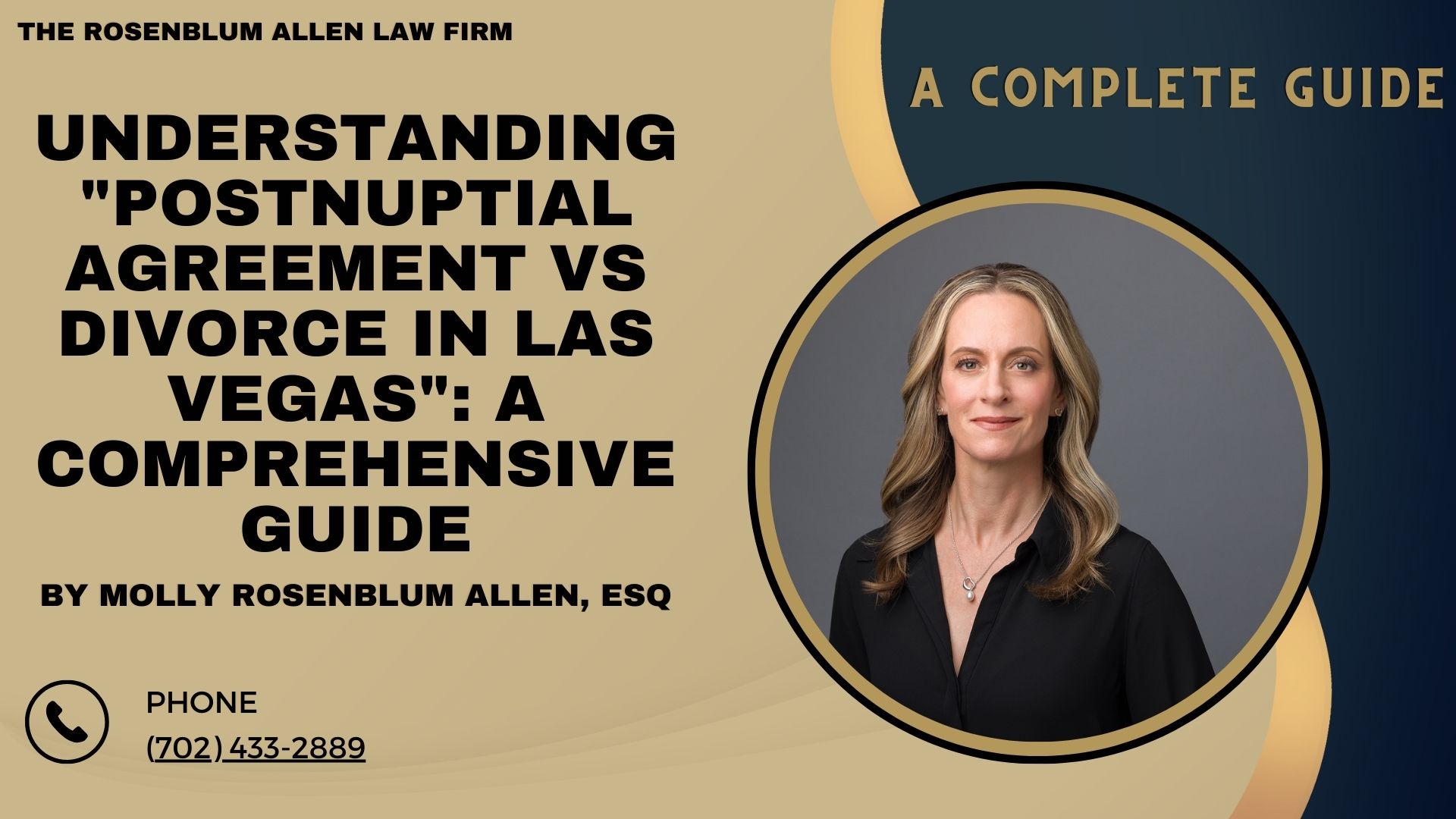Dealing with marital agreements and the chance of divorce can feel like crossing a vast desert. You have no map. But, like the bright lights of Las Vegas guide its visitors, this guide aims to light the path for couples. They face the choice of a postnuptial agreement versus divorce. Whether you’re solidifying your partnership or considering separation. Understanding the law in Las Vegas is key.
Note: Make sure to also check out our Postnuptial Agreement Nevada post while you’re here

Introduction
Welcome to the crossroads of commitment and closure. People know Las Vegas for its quick marriages. But, residents there face the complexity of managing marriage contracts. They also deal with the details of divorce. This guide delves into the details of postnuptial agreements and divorce. It offers clarity to those navigating these personal and legal challenges. Here, we aim to arm you with knowledge, helping you make informed decisions for your future.

Postnuptial Agreements in Las Vegas
Definition and Purpose
A postnuptial agreement is like a roadmap. If a marriage ends, it outlines how assets and debts will be split. It’s a voluntary contract. It’s entered into after marriage. It’s distinct from its cousin, the prenuptial agreement, by its timing.
Legal Requirements for a Valid Postnuptial Agreement
To be valid, your postnuptial agreement must meet Nevada’s specific criteria.
Disclosure of Assets: Full transparency is critical. Both parties must disclose their assets and debts fully and accurately.
Voluntariness and Absence of Duress: The agreement must be entered freely, without pressure or coercion.
Fairness and Reasonableness: The terms should be fair when signing, preventing undue advantage to one spouse.
Benefits of a Postnuptial Agreement
Postnuptial agreements offer a safety net, providing benefits such as:
Clarifying Financial Rights and Responsibilities: It delineates who is responsible for what, financially speaking, during the marriage.
Protecting Individual Assets: It safeguards individual assets, ensuring personal property remains personal if the marriage ends.
Strengthening the Marriage by Reducing Financial Uncertainties: Knowing the financial future can strengthen a marriage, removing potential sources of conflict.
Limitations and Drawbacks
But, like a mirage in the Mojave, postnuptial agreements have their illusions:
Cannot Decide Child Custody or Support: These agreements cannot predetermine child-related matters, which are decided based on the child’s best interests at the time of separation.
May Be Overturned if Not Properly Drafted: A poorly drafted agreement might not hold up in court, making professional guidance essential.
In marital agreements, postnuptial documents testify to a couple’s intentions. They offer clarity and protection. But, they are not a cure for all marital issues. This is especially true for child custody and support. In the next sections, we will explore the different terrain of divorce in Las Vegas. We will offer insights into navigating these complex legal processes.

Divorce in Las Vegas
Understanding Divorce Laws in Las Vegas
In Las Vegas, the glitter of the Strip fades regarding the stark realities of divorce. Nevada is a “no-fault” divorce state, meaning you don’t need to prove wrongdoing to dissolve the marriage. It’s enough for one party to state that the marriage is irretrievably broken.
Grounds for Divorce: No fault (irreconcilable differences) or separation for at least one year.
Residency Requirements: At least one spouse must have lived in Nevada for at least six weeks before filing.
The Divorce Process
The journey through divorce, while not as flashy as a Las Vegas show, has its own set of steps and stages:
Filing for Divorce: This begins with one spouse filing a complaint about divorce in court.
Financial Disclosures: Both parties must disclose their financial situations, detailing assets, debts, income, and expenses.
Mediation and Settlement: Couples may be required to attempt mediation to resolve disputes.
Trial and Final Judgment: If mediation fails, the case goes to trial, ending with a judge’s decree finalizing the divorce.
Critical Issues Addressed During Divorce
Divorce in Las Vegas tackles several critical issues, each with its complexities:
Division of Property: Nevada is a community property state, meaning all marital assets and debts are divided equally.
Child Custody and Support: Decisions are made based on the child’s best interests, focusing on physical and legal custody arrangements.
Alimony: One spouse may be required to provide financial support to the other, depending on various factors such as the length of the marriage and the financial situation of each spouse.
Emotional and Financial Impact of Divorce
Divorce is like a high-stakes poker game. The stakes are real and clear: emotional and financial. It can be emotionally draining and cost a lot. This shows the importance of good legal and emotional support.
Emotional toll: The end of a marriage brings about a spectrum of emotions, from relief to profound sadness.
Financial implications: From legal fees to the division of assets, the economic impact of divorce can be significant and long-lasting.
Postnuptial agreements are preventative. In contrast, divorce ends a marriage. It involves navigating complex legal procedures. You must address many issues, from property division to child custody. We continue to explore the different paths of postnuptial agreements and divorce. It’s essential to remember the value of informed choices and seeking professional help. The next sections will compare these two paths. They will help you choose the right one for you.

Comparing Postnuptial Agreements and Divorce
Marriage decisions are vast. Postnuptial agreements and divorce are different paths. Each has its own implications and outcomes. Understanding the differences can guide you to the best choice for your relationship. It can also show when to use each.
Situations Favoring a Postnuptial Agreement
A postnuptial agreement is like recalibrating your GPS while still on the road. It’s adjusting your journey without ending it. Consider this option if:
You wish to stay married: It’s for couples who want to continue their marriage but desire clarity on financial matters.
There’s been a significant change in finances: Whether it’s an inheritance, a business venture, or a drastic change in income, a postnuptial agreement can safeguard new assets or address new financial responsibilities.
To address issues that weren’t covered in a prenup: Sometimes, couples overlook certain aspects before getting married, or circumstances change, necessitating a new agreement.
When Divorce May Be the Better Option
Divorce, though more final, might be the path to a new beginning if:
Irreconcilable differences: When couples cannot see eye to eye on crucial aspects of their relationship, and there’s no hope for reconciliation.
One or both partners are unhappy: Continuing an unhappy marriage can harm both parties’ emotional well-being.
Abuse or addiction: Situations involving abuse or addiction often necessitate the end of the marriage to ensure the safety and well-being of all involved.
How Postnuptial Agreements Can Impact Divorce Proceedings
If the journey leads to divorce, a postnuptial agreement can affect the process:
Streamlines the division of assets: An explicit agreement can simplify the process, making the division of property and financial responsibilities less contentious.
Potentially reduces legal fees: With less to dispute, the divorce process can be quicker and less expensive.
Sets expectations for alimony: If the agreement includes provisions for spousal support, it can guide decisions during the divorce.

Making the Right Choice for Your Marriage
Deciding between a postnuptial agreement and divorce is a significant crossroads. It needs self-reflection. It needs honesty. And, at times, the courage to choose the less traveled path.
Considering the Health of the Marriage
Reflect on the foundation of your relationship:
Communication and mutual respect: Can you discuss issues openly and respectfully?
Shared goals and values: Do you and your spouse have common objectives and beliefs that still align?
Evaluating Financial Situations
Financial realities often dictate the feasibility of decisions:
Current financial health: Understand your financial situation, individually and as a couple.
Future financial prospects: Consider how a postnuptial agreement or divorce would impact your financial future.
Seeking Legal Advice
Embarking on either path without legal guidance is like navigating a maze blindfolded. Seeking advice from a family law attorney can provide clarity and direction:
Importance of Consulting with a Family Law Attorney: An experienced attorney can offer insights into the legal implications of your decisions and help draft a fair and enforceable postnuptial agreement or navigate the divorce process.
How Legal Guidance Can Help Navigate Choices: Professional advice can demystify legal jargon, outline your options, and help you make informed decisions about your marital future.

Breaking It All Down
You may lean toward reinforcing your marriage with a postnuptial agreement. Or, you may contemplate ending your marriage with divorce. The decision is deeply personal and complex. This guide aims to be your beacon in the night. It will show you the paths open to you in the legal landscape of Las Vegas. Remember, every step forward, no matter how small, is a step toward clarity and resolution. In matters of the heart and law, informed choices pave the way. They lead to a future where peace and happiness can flourish again.

Frequently Asked Questions
Can a postnuptial agreement be updated or revised after it’s been signed?
Yes, both parties can revise or update postnuptial agreements if they agree. This process usually requires legal assistance to ensure the changes meet legal standards and are enforceable.
Is a lawyer required to create a postnuptial agreement in Las Vegas?
While not legally required, it’s highly recommended to involve a lawyer in drafting a postnuptial agreement. Legal counsel can ensure the agreement follows Nevada law, covers all necessary financial matters, and is fair and enforceable in court.
How long does the divorce process take in Las Vegas?
The duration of the divorce process in Las Vegas varies greatly depending on factors such as whether parties contest or agree on the terms, the complexity of the estate, and the court’s schedule. While some divorces can be completed in a few weeks, others may take months or even years.
Can we decide on child custody and support in a postnuptial agreement?
No, a postnuptial agreement in Las Vegas cannot decide child custody and support. These matters are determined by the court based on the child’s best interests during the divorce or separation proceedings.
Are all assets acquired during the marriage divided equally in a Las Vegas divorce?
In general, yes, as Nevada is a community property state, most assets acquired during the marriage are considered joint and are usually divided equally in a divorce. However, there are exceptions and certain factors that can influence this division.
What if my spouse does not agree to a postnuptial agreement?
A postnuptial agreement requires the consent of both parties. If your spouse disagrees, the agreement cannot be executed. Communication about the reasons for disagreement and considering mediation may help address concerns.
Can a postnuptial agreement include terms about personal behavior, such as fidelity clauses?
Yes, postnuptial agreements can include terms about personal behavior, such as fidelity clauses. However, the enforceability of these clauses may vary, and they must not promote divorce or violate public policy.
What happens if we have a postnuptial agreement but divorce in a state other than Nevada?
The enforceability of a postnuptial agreement in a divorce outside of Nevada depends on the laws of the state where the divorce is filed. While most states will enforce a valid postnuptial agreement, there may be variations in how they apply it based on local laws.
Can alimony be waived in a postnuptial agreement in Las Vegas?
Yes, a postnuptial agreement in Las Vegas can include terms for waiving alimony, but only if both parties agree and the terms are fair and do not leave one party destitute or at a significant disadvantage. Legal counsel should ensure that such terms are fair and enforceable.
If we have a postnuptial agreement, do we still need to go through the court for a divorce?
Yes, even with a postnuptial agreement in place, you must still file for divorce in Las Vegas. While the agreement can simplify the process by deciding many financial aspects of the divorce, a judge must legally process and approve the marriage dissolution.

Glossary
Postnuptial Agreement: A legal document created and signed by a married couple that outlines how assets and financial matters will be handled during a divorce or separation. This agreement is made after the marriage has taken place.
Divorce: The legal dissolution of a marriage by a court or other competent body. It officially ends the marriage and allows the parties to remarry.
No-fault Divorce: A type of divorce where the spouse filing for divorce does not have to prove any fault on the other spouse’s part. The grounds for a no-fault divorce are usually “irreconcilable differences” or a similar assertion.
Community Property State: A jurisdiction where property acquired during the marriage is considered owned equally by both spouses, regardless of who purchased it. Nevada is an example of a community property state.
Disclosure of Assets: In a divorce or postnuptial agreement, both parties must fully and accurately disclose their financial assets and debts.
Voluntariness: A legal term indicating an individual’s free will to make an action or agreement without coercion, pressure, or duress.
Fairness and Reasonableness: Legal standards applied to contracts, including postnuptial agreements, to ensure that the terms are balanced and not excessively advantageous to one party over the other.
Child Custody: The legal determination of which parent will have the right to make decisions about a child’s upbringing, including education, health care, and religion.
Child Support: Financial contributions required by law to be made by a non-custodial parent to assist in the upbringing and expenses of their child.
Alimony: A financial support paid by one ex-spouse to the other following a divorce, intended to provide for the receiving spouse’s needs as established during the marriage.
Mediation: A form of alternative dispute resolution where a neutral third party, called a mediator, helps the disputing parties find a mutually acceptable solution.
Residency Requirements: Legal requirements that dictate how long one or both spouses must live in a particular jurisdiction before being eligible to file for divorce there.
Grounds for Divorce: The legal basis upon which a divorce is filed. Grounds can be “fault,” such as adultery or abuse, or “no-fault,” such as irreconcilable differences.
Division of Property: The legal process during a divorce is dividing assets and debts between the spouses according to state law, which, in community property states, is usually an equal split.
Financial Disclosures: Mandatory sharing of financial information between spouses during divorce proceedings, including income, assets, debts, and expenses.
Fidelity Clause: A provision in some postnuptial agreements that outlines consequences for adultery or infidelity, potentially affecting the division of assets or alimony.
Enforceable: A legal term describing an agreement or contract that can be legally upheld or compelled in court.

Additional Resources for You
In your journey through difficult times, our lead attorney, Molly Rosenblum Allen, Esq, has meticulously crafted a suite of resources to support and guide you. We invite you to explore these comprehensive guides, each designed with your needs in mind:
- Navigate the complexities of separation with our Las Vegas Divorce Attorney guide.
- Understand the specifics of state regulations in our Nevada Divorce resource.
- Learn strategies for Surviving Divorce, tailored to help you cope effectively.
- Discover what to do If You Don’t Sign Divorce Papers.
- Assess whether you Need an Attorney to Get a Divorce.
- Explore the benefits and process of Collaborative Divorce.
- Gain insights on How to Win a Divorce with strategic advice.
- Consider the implications and how-to of Switching Lawyers During Divorce.
- Understand How Long Does a Divorce Take in Nevada for planning purposes.
- Get advice on dealing with a High Conflict Divorce.
- Prepare with Questions to Ask a Divorce Lawyer to ensure you’re fully informed.
Molly Rosenblum Allen, Esq, and the team at The Rosenblum Allen Law Firm are committed to providing you with the knowledge and support you need during your time of need.

Outside Resources for You
In addition to the valuable resources created by our lead attorney, Molly Rosenblum Allen, Esq, to aid you through your legal journey, there are several offsite resources you might find beneficial. Here are seven reputable sources that can offer further insights and assistance related to divorce and postnuptial agreements:
American Bar Association (ABA) – Offers a wealth of information on family law and resources for finding legal help.
National Association of Divorce Professionals (NADP) – A network of professionals from various fields providing support and services for those going through a divorce.
Psychology Today – Provides articles and resources on coping with divorce from a psychological perspective, including finding therapists.
SmartAsset – Offers financial advice and tools that can be particularly useful for understanding the financial implications of divorce and postnuptial agreements.
National Domestic Violence Hotline – Offers support and resources for those experiencing domestic violence, a crucial service for individuals considering divorce in such circumstances.
WomensLaw.org – Provides legal information and support to women and survivors of domestic violence, including advice on divorce and protective orders.
DivorceNet by Nolo – Offers detailed legal information on divorce, including state-specific guidelines and resources for self-representation.
Remember, alongside these external resources, Molly Rosenblum Allen, Esq has also meticulously crafted comprehensive guides tailored to support you in your time of need. These include in-depth information on aspects of divorce and family law specific to Las Vegas and Nevada, designed to help you navigate these challenging processes with confidence.

A Special Message from Our Lead Attorney, Molly Rosenblum Allen, Esq

Dear Reader,
Thank you sincerely for taking the time to engage with our resources. I hope you’ve found the information insightful and empowering. It has guided you through what can be a complex and hard period in your life. Knowing your rights and options is the first step. It lets you make informed choices about your future.
At The Rosenblum Allen Law Firm, we devote ourselves to helping our clients. We give them the support, advice, and representation. They need it to navigate their legal issues. You may be considering a postnuptial agreement. Or, you may be facing divorce. We understand the emotional and financial weight of these decisions. We are here to offer our expertise.
I invite you to contact me and my team at (702) 433-2889 to discuss your circumstances further. Together, we can find the best plan for your situation. We can start the process of meeting your legal goals.
We are here to support you every step of the way.
Warmest regards,
Molly Rosenblum Allen, Esq.




